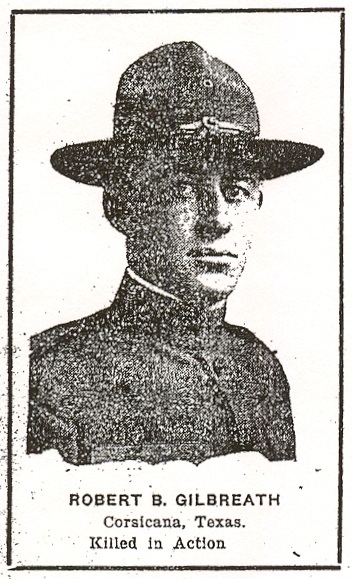|
He was living in Texas where he was working as a teaching instructor for the United States Government at the State Orphan Home in Corsicana at the time he signed the WWI Registration Card. He was single, medium height and build with blue eyes and blonde hair. He trained at Camp Travis , San Antonio , Texas , where he received his commission as Second Lieutenant. He belonged to 358th Infantry, 90th Division. 2nd Lieut. Gilbreath was accustomed to writing his parents on a regular basis. However the last letter they had received was on September 24, 1918. When word came to his parents that he was MIA since September they feared the worst. The word spread to Navarro County as he had relatives living in Corsicana beside all his friends he had made since his residence here. His uncle, J. H. Gilbreath, tried to learn anything he could however a telegram from his brother in Tennessee revealed the certain death of his nephew. The War Department said that when the Germans were surrendering prisoners through Berne , Switzerland , they also transmitted Lieutenant Gilbreath’s identification tag to the American authorities. The parents and all that knew and loved him learned that he was killed, September 26, 1918, during a raid on the enemy lines, and that the German’s secured his body. This fitting memorial to Gilbreath from Lieutenant Frank Liddell, 358th Infantry, 90th Division was repeated in several Texas and Tennessee newspapers: “He arrived in Liverpool on July 4th and immediately went into action…the fighting in which the company was engaged was particularly fierce only 37 Texans having survived out of the original 250. This fighting took place just a few days before the signing of the armistice. Lieut. Liddell stated that he was the only officer left in the company of original quota and continues, 'Capt. Peters was killed the same morning that I was wounded, the boche got his body also Lieut. Gilbreath's, that same morning. They were both killed some 150 yards on my left… “This Division has won itself some reputation, has been congratulated several times by General Pershing and Marshal Foch. We began fighting in the middle of August and have been at it continually, except for two or three days when we were moving from St. Mihiel to Argonne Forest . We have been used as shock troops and not one time have we failed to reach our objectives, but we have paid. We have been through all the hell there is and now it is rumored that we have been chosen to go into Germany , quite a compliment, though, of course, I think we will go over and quiet things and then we will be relieved and sent home. "But Lieutenant Gilbreath will not return home. He has made the supreme sacrifice, the greatest that mortal man can make, and there is consolation in knowing that none were braver than he, and that the enemy saved itself from disaster by removing such as he from the great arena. This young Maury countian was brave, he was courageous, he was inspired by the cause for which his country was fighting; he was not being driven into battle, but with all the force that he could command, he was leading his men face to face with the most despicable enemy that ever cursed the world. He died game fighting like a lion and his body was taken by the enemy as a prize…” Lieut. Gilbreath was survived by his parents, three sisters, Misses Jennie and Verna Gilbreath and Mrs. W. D. Patterson of Columbia ; two brothers, Ear1 of Trinity College, and Claude of Gulfport Military Academy, both of whom were in training for commissions when the armistice was signed. He also has six half brothers.” He was among a long line of Southern boys carrying on a family tradition of fighting and dying for the country they loved so much; Gilbreath’s grandfather died at the Confederate Hospital near Vicksburg , MS , 22 May 1863.Submitted by Dana Subbs
Notes: |
 Robert
Brown Gilbreath was born in Columbia , TN. His parents were
Robert
Brown Gilbreath was born in Columbia , TN. His parents were